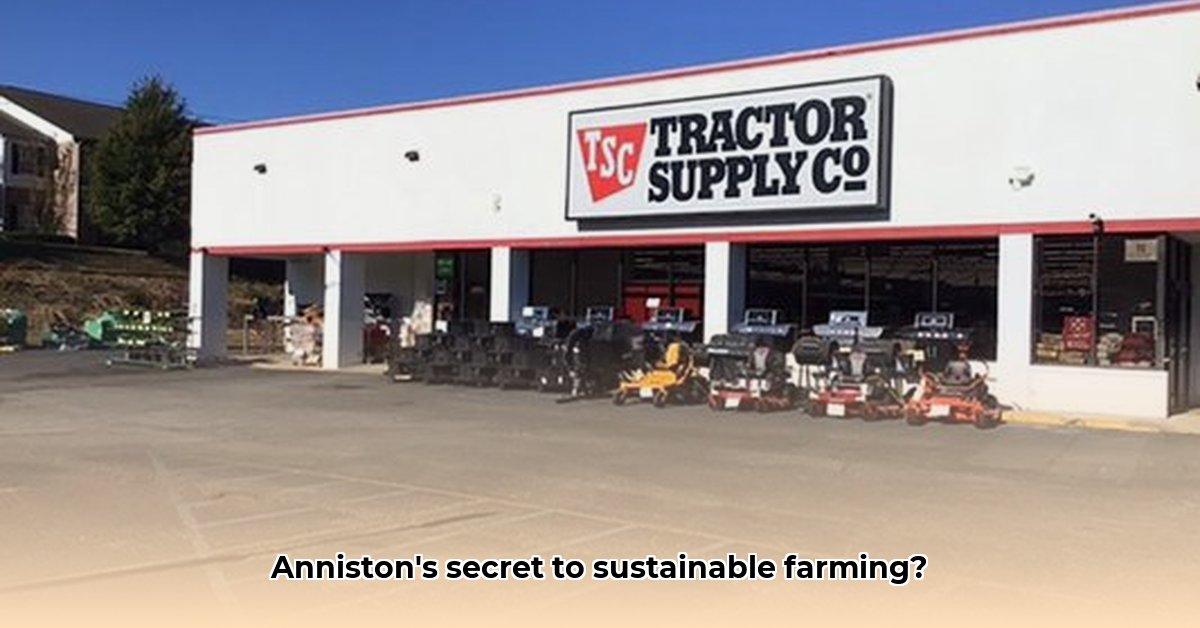
Supporting Local Sustainability Through Sustainable Farming Practices
Tractor Supply Company (TSC) in Anniston, Alabama, significantly impacts the local agricultural community's sustainability efforts. The store offers a range of products directly supporting eco-friendly farming practices. These include organic animal feed, water-efficient irrigation systems, and durable fencing—essential components for environmentally conscious agriculture. For similar efforts in other locations, see the Chelsea, AL Tractor Supply page. However, a complete assessment necessitates a deeper dive into their operations and supply chain.
Gaps in the Data: A Need for Transparency
While TSC Anniston provides numerous sustainable options, a comprehensive understanding of its overall environmental impact remains elusive. Critical data regarding product sourcing and the complete lifecycle environmental footprint is currently unavailable. This lack of transparency presents a significant risk, potentially affecting customer perception and brand loyalty. For instance, knowing the origin and transportation methods of the organic feed—is it locally sourced, or does it travel long distances, thereby increasing its carbon footprint?—is crucial for a thorough sustainability evaluation. Similarly, understanding the manufacturing processes and materials used in their irrigation systems and fencing is essential for a more nuanced environmental impact assessment. This data is vital for a complete sustainability assessment and building trust with environmentally conscious consumers.
Actionable Steps Towards a Greener Future
To enhance its sustainability profile and better serve the Anniston community, TSC needs a multi-pronged approach involving short and long-term strategies for its management, employees, local farmers, and the Anniston community at large.
For Tractor Supply Anniston AL Management:
Short-Term Goals (0-1 year):
- Customer Feedback Integration: Conduct thorough customer surveys and focus groups to pinpoint desired sustainable products and services. This direct feedback will directly influence future purchasing decisions and product offerings.
- Enhanced Employee Training: Equip staff with comprehensive knowledge of sustainable farming practices to empower them to effectively counsel and advise customers on eco-friendly choices.
Long-Term Goals (3-5 years):
- Targeted Marketing Initiatives: Develop focused marketing campaigns emphasizing the environmental and economic benefits of sustainable products. Strategic partnerships with local organizations can enhance brand credibility and reach.
- Sustainable Product Expansion: Expand the range of eco-friendly products, prioritizing locally sourced items whenever feasible, based on customer feedback and market trends. This supports local businesses and reduces transportation-related environmental impact.
For Local Farmers and Gardeners:
Short-Term Actions:
- Maximize Store Resources: Engage actively with TSC staff to leverage their expertise and gain valuable insights into adopting sustainable agricultural practices. Consultations and staff advice are valuable resources.
- Provide Constructive Feedback: Communicate directly with TSC staff about the products and resources that would best support their sustainable farming goals. This feedback loop is critical for aligning store offerings with local needs.
Long-Term Actions:
- Advocate for Needed Products: Actively express the desire for specific sustainable products to TSC management, influencing their purchasing decisions and product selection. This direct engagement ensures that the store stocks materials that the local farming community requires.
- Community Collaboration: Participate in joint sustainability efforts and initiatives with TSC, amplifying the positive impact on the community. Collaborative efforts yield larger results than independent action.
For Tractor Supply Corporate:
Short-Term Goals (0-1 year):
- Data-Driven Decision Making: Analyze sales data from the Anniston store (and others) to identify customer preferences for sustainable products, informing future inventory and product decisions.
Long-Term Goals (3-5 years):
- Transparency Through Reporting: Implement a comprehensive sustainability audit, creating a detailed report tracking the environmental impact across the entire supply chain. Publicly release this report, fostering transparency and building trust with customers and stakeholders. This should include metrics such as carbon footprint, water usage, and waste generation.
- Sustainable Supply Chain: Collaborate with suppliers who uphold rigorous ethical and environmental standards. Identify and prioritize sustainable sourcing initiatives throughout the entire supply chain. This commitment to sourcing will translate to tangible environmental sustainability benefits.
Understanding the Potential Challenges: A Risk Assessment
Several challenges could hinder TSC's sustainability initiatives. Proactive mitigation strategies are crucial to success.
| Risk Factor | Likelihood | Impact | Mitigation Strategy |
|---|---|---|---|
| Low Customer Demand for Sustainable Goods | Medium | Medium | Targeted marketing campaigns highlighting both environmental and long-term cost savings associated with sustainable agriculture practices. |
| Supply Chain Sustainability Issues | Low | High | Partner with certified sustainable suppliers; implement rigorous supply chain transparency initiatives; conduct thorough due diligence on all suppliers. |
| Competition from Other Retailers | Medium | Medium | Highlight TSC's local expertise, exceptional customer service, and unique bundles of sustainable products tailored to the Anniston community's needs. |
| Negative Publicity (Supply Chain Issues) | Low | High | Proactive communication, rapid response to concerns, and a visible commitment to continuous improvement in sustainability practices. |
Navigating Regulations: Maintaining Legal Compliance
TSC must fully comply with all pertinent regulations concerning pesticide use, animal welfare, environmental protection, and product labeling. Non-compliance can lead to significant fines and damage to brand reputation. Regular updates and knowledge of relevant laws are crucial for continuous compliance.
Looking Ahead: A Collaborative Vision for Sustainability
TSC Anniston possesses significant potential to foster sustainable agricultural practices within its community. By proactively addressing data gaps, implementing the recommended strategies, and fostering strong collaboration among stakeholders, the store can significantly enhance its positive environmental impact. This collaborative approach is integral to achieving a more sustainable future for Anniston and surrounding areas. Continued learning, adaptation, and a commitment to transparency are essential for long-term success.